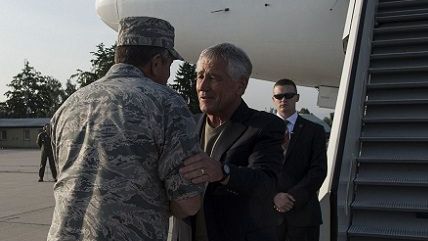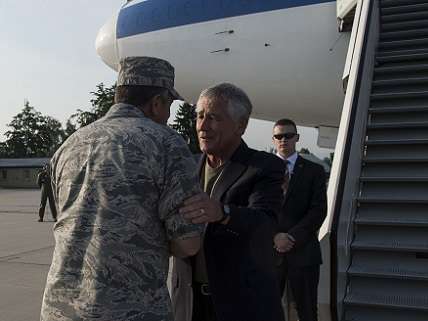Another Bad War in Iraq
Sometimes, the safest policy is watchful waiting.


In fighting disease, aggressive action is not always advisable. Two years ago a federal panel recommended against routine use of a test for prostate cancer because it carries "a very small potential benefit and significant potential harms." Some men get false positives, and many true positives lead to risky surgery for cancers that grow so slowly as to pose no threat.
Then there is power morcellation, which uses a device to shred uterine fibroids. The Food and Drug Administration has warned against its use in hysterectomies because "there is a risk that the procedure will spread the cancerous tissue within the abdomen and pelvis, significantly worsening the patient's likelihood of long-term survival."
All this has relevance beyond medicine. When President Barack Obama denounced the jihadist group the Islamic State that beheaded American journalist James Foley, he called for action "to extract this cancer so that it does not spread." The United States has been bombing its positions in Iraq and may expand the attacks into Syria. This could be the prelude to a bigger U.S. undertaking.
As least that's what our leaders seem to be hinting at. Defense Secretary Chuck Hagel claimed the Islamic State is a threat "beyond anything that we've seen." Joint Chiefs of Staff Chairman Gen. Martin Dempsey called it an "apocalyptic" group that will "have to be defeated."
The hysteria confirms that the U.S. government can turn any enemy into a rampaging Godzilla posing an imminent threat to our survival. In reality, this one is a fringe insurgency with maybe 10,000 fighters who are stretched thin and outgunned by the Iraqi military.
The group, whose fanatical nature is not in dispute, has managed to rout units of the Iraqi army and gain control of a slice of territory. Its leaders claim to have founded a strict theocratic state on behalf of Muslims the world over. They vow to "raise the flag of Allah in the White House."
If big talk were music, these guys would be a marching band. But issuing threats is easier than making good on them, and seizing turf is not the same as keeping it. The Islamic State's success promises to be its undoing. U.S. military intervention is more likely to multiply the danger than reduce it.
Even Dempsey admits there is no evidence the group is plotting attacks on the U.S. That's not surprising. It's pretty occupied right now fighting the Kurdish army and the Syrian army. Being Sunni in a Shiite-majority country, it isn't likely to try to march to Baghdad, where the Iraqi army would have the help of Shiite militias.
We are supposed to be impressed that the Islamic State controls a swath of land, which al-Qaida never did. But Ohio State University political scientist John Mueller says that's not the advantage it appears to be.
"The fact that they want to hold territory and are likely to deeply alienate the people in their territory means that, unlike terrorists, they will present lucrative targets while surrounded by people who are more than willing to help with intelligence about their whereabouts," he told me.
It's often forgotten that al-Qaida proclaimed its own state in Iraq in 2007, but its brutal ways alienated fellow Sunni insurgent groups so completely that they switched to our side. The Islamic State is equally vulnerable to a backlash.
As for the prospect that it could hit the homeland, our usual problem in deterring terrorists is that their bombs have no return address. The Islamic State, by contrast, is adorned with a neon bull's-eye.
"The place would be a miserable, ostracized blotch on the map with no ability to project power at a distance," argues Paul Pillar of the Center for Security Studies at Georgetown University in The National Interest. It is surrounded by enemies—not only the Kurds, but the governments of Iraq, Iran and Syria.
Given all the local trouble it faces, the Islamic State can ill afford to focus on attacking the U.S. unless the U.S. focuses on attacking it. Like power morcellation, American military intervention may spread the cancer instead of killing it.
That's been the story of our involvement in wars in that part of the world since 9/11. The more we do the more turmoil there is and the more endangered we feel. But with potential foreign dangers, as with prostate cancer, reflexive fear can be deadly. Sometimes, the safest policy is watchful waiting.
Editor's Note: As of February 29, 2024, commenting privileges on reason.com posts are limited to Reason Plus subscribers. Past commenters are grandfathered in for a temporary period. Subscribe here to preserve your ability to comment. Your Reason Plus subscription also gives you an ad-free version of reason.com, along with full access to the digital edition and archives of Reason magazine. We request that comments be civil and on-topic. We do not moderate or assume any responsibility for comments, which are owned by the readers who post them. Comments do not represent the views of reason.com or Reason Foundation. We reserve the right to delete any comment and ban commenters for any reason at any time. Comments may only be edited within 5 minutes of posting. Report abuses.
Please to post comments


So we're now flying air cover for both (a) the Iranian Quds forces operating in Iraq and (b) Assad's government in Syria.
Genius. Just fucking genius. How's that liberaltarian nonintervention working out for everyone? Is providing military support for (a) a corrupt and inept Iraqi government, (b) a murderous and terroristic Iranian theocracy and (c) a brutal dictatorship what you had in mind?
Shreek will be along any moment now to tell us how Obama is doing the right thing, because Boosh, and then add that Warren Buffet did good on some investment.
Shreek will be along any moment now to tell us how Obama is doing the right thing
So you're defending an occupation of 150,000 US troops?
Certainly you're with Obama on not doing something that stupid.
You are, right?
No, I'm not defending Bush or your beloved Obama, they both suck, can you grasp that concept? No, now go away. Don't you have some emails to find?
I bet he's been looking everywhere.
He's missed that 8%.
Palin's Buttplug|8.28.14 @ 12:24PM|#
"Shreek will be along any moment now"
Right on cue, turd.
And in 2008, I was helping the Iraqi Army 14th DIV cope with a batch of IRGC prisoners that were caught when they retook Basra from the Jaish al Mahdi. Now, we provide CAS for them.
I do believe I am going to go bang my head on a table in the break room. BRB.
Are you back yet, Sir?
Slow, deep breaths ....
"How's that liberaltarian nonintervention working out for everyone?"
I suppose we will have to actually try it before we can know whether it works or not.
"Genius. Just fucking genius. "
Remember that next time a candidate vows, and they will, that 'all options are on the table.'
In defence of Obama, he's not a libertarian non-interventionist, and never lead anyone to believe he was. Building coalitions with regional powers seems the best way to defeat IS. Iran, Iraq and Syria are only the beginning. To be successful, Obama will have to bring along Baathists and Sunni tribespersons.
..."To be successful, Obama will have to bring along Baathists and Sunni tribespersons."
Self described hypocrite and liar is here to, ell, lie some more I guess.
I'll be honest with you for once. You're at your most amusing when you work yourself into full moran mode. This post shows you're not there yet.
"YOUR A MORAN!!"
youtube commentors are proud of you
Sevo doesn't need your help. He can do this on his own. Give him a chance.
STFU, twit.
You spelled maroon wrong.
mtrueman|8.28.14 @ 1:43PM|#
"I'll be honest with you for once."
Says the self-described hypocrite.
But .... but ... ISIS said they're going to get us! We have to do something!
I know -- Sue 'em for slander!
In reality, this one is a fringe insurgency with maybe 10,000 fighters who are stretched thin and outgunned by the Iraqi military.
I hope you are right about that. If it is, then this won't be much of a war will it? That talking point doesn't match up with "its a quagmire" talking point.
And yes they will alienate the population and the population will grow to hate them. But the population hates the government of Iran and North Korea and Saudi Arabia. Being popular is not a requirement for a government to stay in power. The only requirement is having enough guns and people willing to use t hem. And ISIS seems to have that for the moment.
Yes Falujuja did rise up in 2004, with our help. So. I am not really seeing how that example makes the point you think it does.
The "quagmire" comes once those 10,000 are defeated, the same way the quick and handy defeat of Saddam's army didn't turn out to be the end of our involvement in 2003.
Then there are a lot more than 10,000 there. Chapman is working under the assumption that defeating our enemies will somehow get everyone to want to join them whereas letting them win will cause everyone to leave them. It is possible I guess. But generally, success brings more recruits than defeat.
I don't think the concern is whether or not "our" enemies can be defeated. The question is "what then?"
No one seems to have a very good answer for that question.
"It's often forgotten that al-Qaida proclaimed its own state in Iraq in 2007, but its brutal ways alienated fellow Sunni insurgent groups so completely that they switched to our side."
Same thing happened in Mali.
"The place would be a miserable, ostracized blotch on the map with no ability to project power at a distance,"
That won't stop the fear-mongering from the GOP.
Hey TeleTubby, aka Weigel.
That won't stop the fear-mongering from the GOP both teams or stop Obama from acting like a damn fool who has no idea WTF he's doing and saying stupid shit about red lines.
FIFY, dimwit.
Yes, that "red line" comment cost us trillions.
Wait - no it didn't.
In the minds of simpletons, everything has to be a comparative to something else, while more enlightened people can judge something on it's own accord.
In the small little pea sized brain of a Shreeky, everything is to be compared to what Booosh did. Derp.
It's not sentient.
But it is a turd.
Slactivist blames everyone but Obama for the stupidity of Obama bombing Iraq
Fear-mongering from the GOP? Did I hear someone shriek that?
GOPpers like Chuck Hagel and John Kerry? THOSE Team Red guys?
What a maroon.
It's a simpleton, it can't help it.
Sounds a lot like Israel today...
Hey, wait just a minute!
"The place would be a miserable, ostracized blotch on the map with no ability to project power at a distance," argues Paul Pillar of the Center for Security Studies at Georgetown University in The National Interest. It is surrounded by enemies?not only the Kurds, but the governments of Iraq, Iran and Syria."
ISIS doesn't need to "project power"; all they need to do is get a few dozen guys with valid passports and a plan into the US. We all saw how 9/11 "changed everything". There are targets that are far more psychologically effective than the WTC or Pentagon.
Martha Stewart?
CHRISTFAGS! FAKE SKANDULZ!
BOOOOOOOOOOOOOOOOOOSH!
That about do it?
Gah. Head banged, table remains undented.
Now a cup of tea and not thinking about this any more.
You spelled whiskey wrong.
Ah, you meant whisky, yes?
Cannot have while I am fighting down this cough - don't want to end up with some Caledonian version of the Purple Drank.
Try tequila shots instead. They're healthful because of the lime.